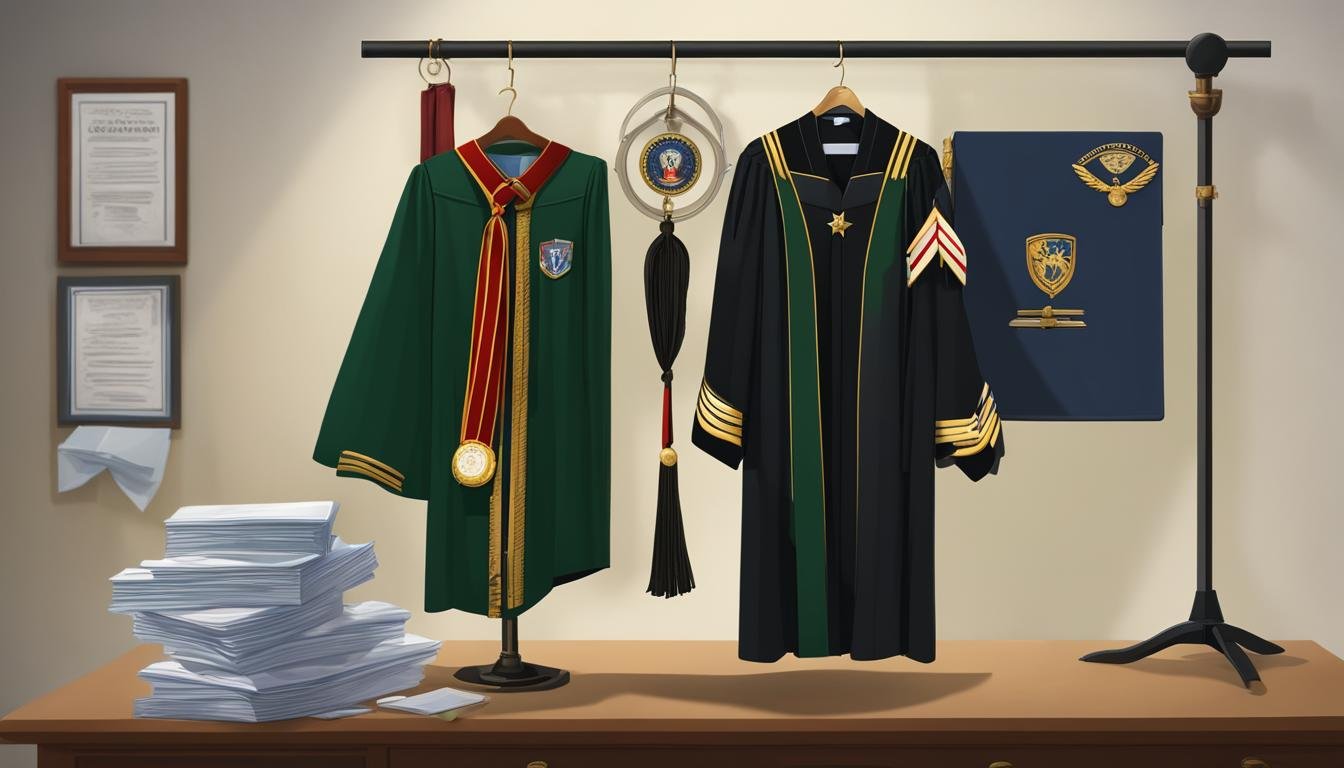Transitioning from military service to civilian life can be a daunting prospect, especially for those aiming to earn a graduate degree. As a military veteran, you may be wondering how to access the various education benefits available to you during this transition period. This section will provide you with strategic steps to ease the process and guide you in navigating the military benefits specifically tailored for college education.
Key Takeaways:
- Navigate the various military benefits available for college education
- Create a plan for your graduate degree by self-assessing your interests and skills
- Research universities that provide strong support systems for veterans
- Maximize your military benefits by understanding eligibility criteria and application processes
- Develop effective time management skills to balance graduate school and other responsibilities
Creating a Plan for Your Graduate Degree

Transitioning from military service to pursuing a graduate degree can be an exciting opportunity for personal and professional growth. To make the most of this transition, it is essential to create a clear plan that aligns with your interests, skills, and future goals. Taking the time for self-assessment is a crucial first step to identify the most suitable field of study for your graduate degree.
Reflect on your experiences, both within the military and outside of it, to gain insights into your passions and strengths. Consider how your military experience can be leveraged in academia. For example, leadership skills gained during service can be valuable in various disciplines, such as business or public administration. Identifying the areas where your military background intersects with your academic interests can help you choose a field of study that aligns with your aspirations and allows you to leverage your unique experiences.
Once you have identified your field of study, set clear, achievable goals and outline the necessary steps to accomplish them. Break down the process into smaller milestones, such as researching potential universities, securing necessary funding, and preparing application materials. By creating a timeline and actionable plan, you can stay organized and focused throughout the transition process.
Remember, transitioning from military service to academia is a significant change, and it is normal to feel uncertain or overwhelmed at times. However, by taking the time to self-assess, consider your military experience, and create a detailed plan, you can navigate this transition with confidence and set yourself up for success in your graduate studies.
Table: Fields of Study for Military Veterans
| Field of Study | Potential Application of Military Experience |
|---|---|
| Business Administration | Leadership skills, strategic planning, decision-making |
| Engineering | Problem-solving, attention to detail, teamwork |
| Psychology | Interpersonal skills, empathy, counseling |
| Public Administration | Policy analysis, project management, organizational skills |
| Healthcare | Emergency response, teamwork, adaptability |
Table: Fields of Study for Military Veterans
As a transitioning military veteran, your unique experiences and skills can significantly contribute to your success in academia. By creating a plan and leveraging your military background, you can choose a field of study that aligns with your aspirations and utilize your strengths in pursuit of your graduate degree.
Remember that each individual’s journey is unique, and it is important to seek guidance from academic advisors, veterans’ resource centers, and fellow veterans who have successfully transitioned into academia. By networking and connecting with others who have gone through similar experiences, you can gain valuable insights and mentorship opportunities to help you navigate the transition smoothly.
Researching and Networking for Support

When transitioning from military service to college, it’s important to thoroughly research and connect with support networks that can assist you throughout your academic journey. Many universities offer dedicated resources for veterans, including veteran support centers, academic advisors, and counseling services. Researching universities with strong support systems for veterans is essential to ensure a smooth transition and a successful college experience.
Start by exploring the websites of potential universities and look for information about their veteran support programs. Pay attention to the resources available, such as specialized advising, networking opportunities, and financial aid specifically for veterans. Some universities even have dedicated veteran resource centers, where you can find additional guidance and support.
Aside from university resources, networking with other veterans who have successfully transitioned into higher education can be incredibly beneficial. Online communities, social media groups, and veteran-specific organizations provide platforms for connecting with individuals who have gone through similar experiences. These networks can offer valuable insights, advice, and mentorship as you navigate your academic journey.
Benefits of Researching and Networking for Support:
- Access to specialized resources and services tailored to the needs of veterans
- Opportunities to connect with academic advisors who understand the unique challenges and opportunities faced by transitioning military students
- Potential to form relationships with fellow veterans who can provide guidance and support throughout your college experience
- Access to veteran-specific scholarships and financial aid opportunities
- Increased awareness of university policies and benefits available to veterans
By conducting thorough research and actively networking with other veterans, you can ensure that you have the support and resources necessary to thrive in your college journey. Remember that seeking assistance is a sign of strength, and universities are there to help you make a successful transition from military service to academic life.
What Are the Key Military Benefits to Consider When Transitioning to College?
When transitioning from military benefits to college, veterans can take advantage of the GI Bill, which helps cover tuition costs and provides a monthly housing allowance. Additionally, military training and experience can often translate into college credits, saving time and money on degree completion.
Maximizing Your Military Benefits and Time Management
To make the most of your transition to college, it is crucial to understand and maximize the military benefits available to you. Take advantage of programs like the GI Bill and Yellow Ribbon Program, which can provide financial assistance for your education. Familiarize yourself with the eligibility criteria and application process, ensuring that you meet all the requirements to receive these benefits.
Additionally, prioritize effective time management skills to successfully balance the demands of graduate school and other responsibilities. Develop a schedule that allows you to allocate dedicated time for studying, attending classes, and completing assignments. Use tools like calendars, planners, or mobile apps to stay organized and ensure you make the most of your time.
Don’t forget to also take care of your physical and mental well-being. Grad school can be demanding, so it’s important to prioritize self-care. Make time for exercise, relaxation, and hobbies that bring you joy. Seek support from your university’s transition support services, as they can provide valuable resources and guidance to assist you during this period of adjustment.
Remember, transitioning military students have access to unique benefits and support systems. By maximizing your military benefits and effectively managing your time, you can set yourself up for success in college and beyond.



